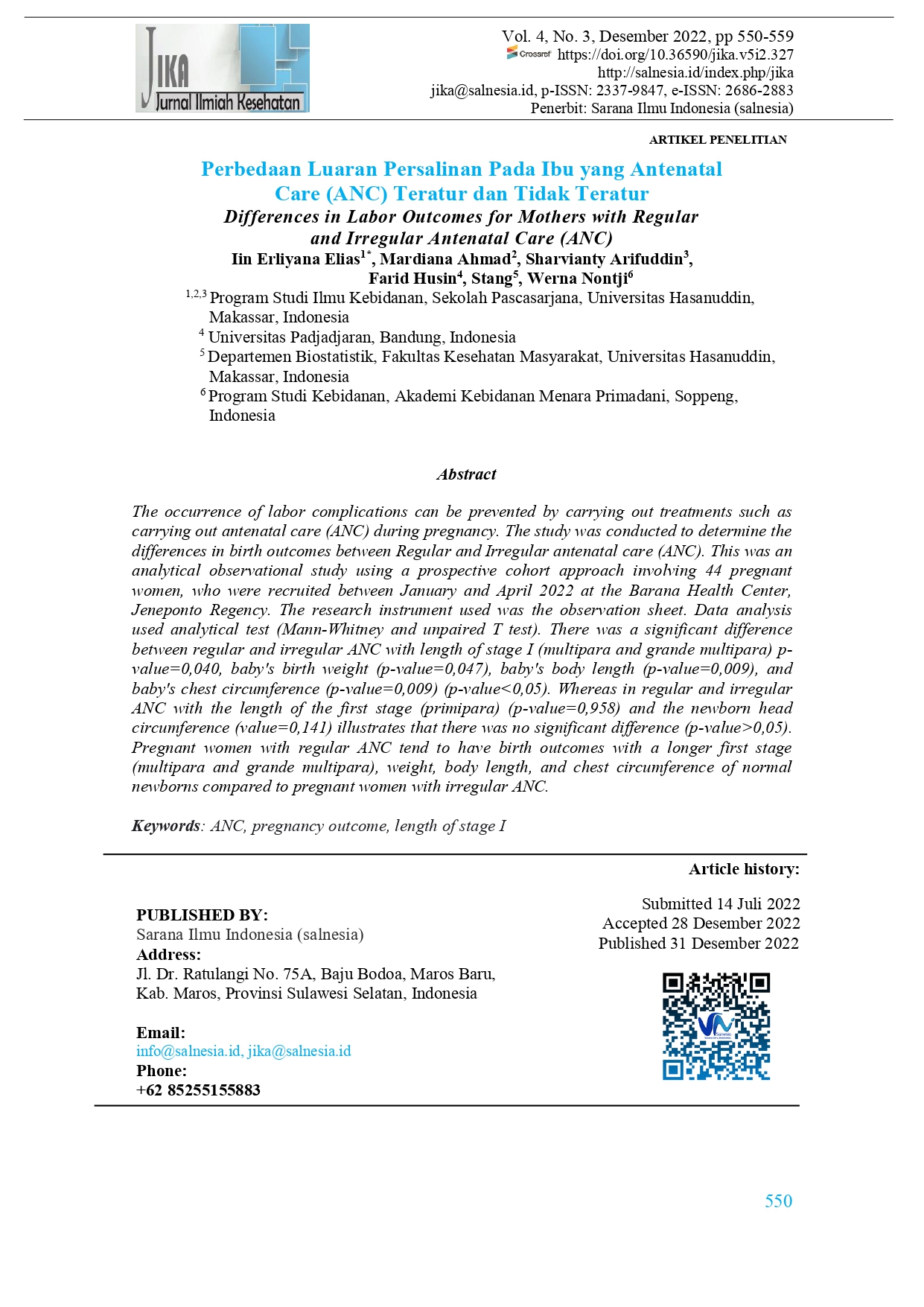Differences in Labor Outcomes for Mothers with Regular and Irregular Antenatal Care (ANC)
DOI:
https://doi.org/10.36590/jika.v4i3.327Keywords:
ANC, pregnancy outcome, length of stage IAbstract
The occurrence of labor complications can be prevented by carrying out treatments such as carrying out antenatal care (ANC) during pregnancy. The study was conducted to determine the differences in birth outcomes between Regular and Irregular antenatal care (ANC). This was an analytical observational study using a prospective cohort approach involving 44 pregnant women, who were recruited between January and April 2022 at the Barana Health Center, Jeneponto Regency. The research instrument used was the observation sheet. Data analysis used analytical test (Mann-Whitney and unpaired T test). There was a significant difference between regular and irregular ANC with length of stage I (multipara and grande multipara) p-value=0,040, baby's birth weight (p-value=0,047), baby's body length (p-value=0,009), and baby's chest circumference (p-value=0,009) (p-value<0,05). Whereas in regular and irregular ANC with the length of the first stage (primipara) (p-value=0,958) and the newborn head circumference (value=0,141) illustrates that there was no significant difference (p-value>0,05). Pregnant women with regular ANC tend to have birth outcomes with a longer first stage (multipara and grande multipara), weight, body length, and chest circumference of normal newborns compared to pregnant women with irregular ANC.
Downloads
References
Abalos E, Chamillard M, Díaz V, Pasquale J, Souza JP. 2020. Progression of the First Stage of Spontaneous Labour. Best Practice and Research: Clinical Obstetrics and Gynaecology. 67: 19–32. https://doi.org/10.1016/j.bpobgyn.2020.03.001.
Amalia R, Nurdin A, Sari JI, Sakinah AI. 2020. Hubungan Lingkar Lengan atas Ibu Hamil terhadap Antropometri Bayi Baru Lahir di Rumah Sakit Ibu dan Anak Ananda Kota Makassar. Jurnal Kedokteran. 6(1): 57-67. http://dx.doi.org/10.36679/kedokteran.v6i1.274.
Antari GY. 2019. Hubungan Anemia pada Ibu Hamil Trimester III dengan Ukuran Lingkar Kepala Bayi Baru Lahir. Jurnal Ilmiah Media Bidan. 4(2): 99-103.
Budiarti T. 2019. Determinant of Length of New Born. Jurnal Wawasan Kesehatan Ilmiah Ilmu Kesehatan. 5(2): 175–179. https://doi.org/10.33485/jiik-wk.v5i2.123.
Degno S, et al. 2021. Adverse Birth Outcomes and Associated Factors Among Mothers who Delivered in Bale Zone Hospitals, Oromia Region, Southeast Ethiopia. Journal of International Medical Research. 49(5):1-12. https://doi.org/10.1177/03000605211013209.
Dessy Elvira DE. 2019. Studi Kualitatif Analisis Implementasi Standar Pelayanan Antenatal Care 10 Terpadu pada Ibu Hamil di Puskesmas Bungus Kota Padang Tahun 2019. J-KESMAS: Jurnal Kesehatan Masyarakat. 5(2):151. https://doi.org/10.35329/jkesmas.v5i2.520.
Ellen P, et al. 2020. An Effectiveness-Implementation Hybrid Type 1 Trial Assessing the Impact of Group Versus Individual Antenatal Care on Maternal and Infant Outcomes in Malawi. BMC Public Health. BMC Public Health. 20(1):1–13. https://doi.org/10.1186/s12889-020-8276-x.
Fitri I, Wiji RN. 2018. Asupan Zat Gizi Makro dan Kenaikan Berat Badan Selama Hamil terhadap Luaran Kehamilan. Jurnal Gizi Klinik Indonesia. 15(2): 66–74. http://dx.doi.org/10.22146/ijcn.39163
Hailemichael HT, Debelew GT, Alema HB. 2020. Determinants of Adverse Birth Outcome in Tigrai Region, North Ethiopia?: Hospital- Based Case-Control Study. BMC Pediatrics. 1–9. https://doi.org/10.1186/s12887-019-1835-6.
Hidayah A, Sumini GT, Santutri Bedha Y, Jombang SH. 2021. Perbedaan Tingkat Kecemasan Ibu Hamil Primigravida dan Multigravida Trimester III dalam Menghadapi Persalinan di RSU Al Islam H.M Mawardi Sidoarjo Tahun 2020. Hospital Majapahit. 13(1):112-121. https://doi.org/10.5281/zenodo.4558621.
Homer CSE, et al. 2019. Maternal and Perinatal Outcomes by Planned Place of Birth in Australia 2000 - 2012: A linked population data study. BMJ Open, 9(10): 1–12. https://doi.org/10.1136/bmjopen-2019-029192.
Hutasoit M, Utami KD, Afriyliani NF. 2020. Kunjungan Antenatal Care Berhubungan dengan Kejadian Stunting. Kesehatan Samodra Ilmu, 11(1): 1–10.
Ike N, Kurniasih D, Marwati TA, Hidayat A, Makiyah Nurul SN. 2020. Evaluasi Penerapan Standar Layanan 10T Antenatal Care (ANC). Jurnal Riset Kesehatan Poltekkes Depkes Bandung. 12(2):429-444. https://doi.org/10.34011/juriskesbdg.v12i2.1795.
Kacperczyk-Bartnik J, Bartnik P, Symonides A, Sroka-Ostrowska N, Dobrowolska-Redo A, Romejko-Wolniewicz E. 2019. Association between antenatal classes attendance and perceived fear and pain during labour. Taiwanese Journal of Obstetrics and Gynecology. 58(4): 492–496. https://doi.org/10.1016/j.tjog.2019.05.011.
Kolola T, Morka W, Abdissa B. 2020. Antenatal care booking within the first trimester of pregnancy and its associated factors among pregnant women residing in an urban area: A cross-sectional study in Debre Berhan town, Ethiopia. BMJ Open. 10(6): 1–6. https://doi.org/10.1136/bmjopen-2019-032960.
Mustaghfiroh L, Hesti NP. 2022. Pengaruh Pijat Oksitosin terhadap Lama Kala I Persalinan. Jurnal Ilmiah STIKES Kendal, 12(2): 279–286. https://journal2.stikeskendal.ac.id/index.php/PSKM/article/view/58.
Tamirat KS, Sisay MM, Tesema GA, Tessema ZT. 2021. Determinants of adverse birth outcome in Sub-Saharan Africa?: analysis of recent demographic and health surveys. BMC Public Health. BMC Public Health, 1–10. https://doi.org/10.1186/s12889-021-11113-z.
Tesfaye G, Loxton D, Chojenta C, et al. (2017) ‘Delayed initiation of antenatal care and associated factors in Ethiopia: A systematic review and meta-analysis’, Reproductive Health, 14(1). https://doi.org/10.1186/s12978-017-0412-4.
Tilden EL, et al. 2022. The duration of spontaneous active and pushing phases of labour among 75,243 US women when intervention is minimal: A prospective, observational cohort study. eClinicalMedicine. Elsevier Ltd, 48: 101447. https://doi.org/10.1016/j.eclinm.2022.101447.
Tyagi S, Singh Toteja G, Bhatia N. 2017. Maternal Nutritional Status and Its Relation with Birth Weight. International Journal of Health Sciences & Research. 7(8): 422-433.
Uddin MJ, Hoque M, Nazia S, Chowdhury AS. 2019. Detection of LBW Newborn by Measuring Chest Circumference. Dhaka Shishu (Children) Hospital Journal. 35(1):22-26. https://doi.org/10.3329/dshj,v35i1.51704.
Wimilda G, Sulistyowati P, Layliyah Z. 2020. Hubungan Kecemasan dengan Lama Persalinan Kala 1 pada Ibu Bersalin. Jurnal Keperawatan dan Kesehatan. 5(2):100–107. https://doi.org/10.52488/jnh.v5i2.123.
Zile I, Villerusa A. 2019. Comparison of antenatal care factors and neonatal outcomes in rural and urban context. The European Journal of Public Health. 24(suppl_2). https://doi.org/10.1093/eurpub/cku165.073.

Downloads
Published
How to Cite
Issue
Section
License
Copyright (c) 2022 Iin Erliyana Elias, Mardiana Ahmad, Sharvianty Arifuddin, Farid Husin, Stang, Werna Nontji

This work is licensed under a Creative Commons Attribution 4.0 International License.








